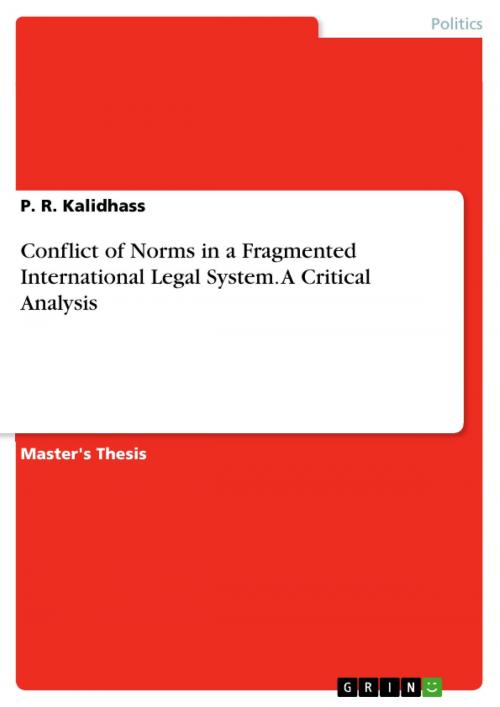| Author: | P. R. Kalidhass | ISBN: | 9783656655183 |
| Publisher: | GRIN Verlag | Publication: | May 16, 2014 |
| Imprint: | GRIN Verlag | Language: | English |
| Author: | P. R. Kalidhass |
| ISBN: | 9783656655183 |
| Publisher: | GRIN Verlag |
| Publication: | May 16, 2014 |
| Imprint: | GRIN Verlag |
| Language: | English |
Master's Thesis from the year 2010 in the subject Politics - International Politics - Topic: Public International Law and Human Rights, grade: A plus, Jawaharlal Nehru University , course: Master of Philosophy (M.Phil.), language: English, abstract: From the beginning of the twenty-first century the international community started addressing the issue of fragmentation of international law. In 2000, the International Law Commission (ILC) decided to include the topic '[r]isks ensuing from the fragmentation of international law' into its long-term programme of work. This initiative raises some basic questions: is international law a fragmented system? If it is so, what is the problem with the fragmentation? and how can the problem be resolved? This dissertation mainly revolves around these three major issues. It assumes that today's fragmented international law is part of historical evolution or process. In contemporary times, the term 'fragmentation' is commonly used to refer to the slicing up of international law 'into regional or functional regimes that cater for special audiences with special interests and ethos'. The most notable functional regimes are international trade law, environmental law, human rights law, humanitarian law, law of the sea and so on - when there is a collision between these regimes - than the conflict of norms becomes an unavoidable consequence - because each regime seeks favorable treatment towards its own. The absence of normative and institutional hierarchy in international law means that the evolution of such regimes is perceived by some as posing a threat to the coherence, effectiveness and predictability of international law. Others see these regimes as contributing to the development of international law. To respond to the problem of fragmentation, the ILC examined the regimes in detail and tentatively concluded that these specialized legal regimes are merely informal labels with no normative value per se - hence, it viewed that they are all within or part of broader territorial domain of general international law - and codified some of existing conflict resolving techniques to solve the problem of conflict of norms. However, the proposed techniques solve the conflict of norms only within regimes but not across regimes. The question remains as to how to solve the norm conflict across regimes?
Master's Thesis from the year 2010 in the subject Politics - International Politics - Topic: Public International Law and Human Rights, grade: A plus, Jawaharlal Nehru University , course: Master of Philosophy (M.Phil.), language: English, abstract: From the beginning of the twenty-first century the international community started addressing the issue of fragmentation of international law. In 2000, the International Law Commission (ILC) decided to include the topic '[r]isks ensuing from the fragmentation of international law' into its long-term programme of work. This initiative raises some basic questions: is international law a fragmented system? If it is so, what is the problem with the fragmentation? and how can the problem be resolved? This dissertation mainly revolves around these three major issues. It assumes that today's fragmented international law is part of historical evolution or process. In contemporary times, the term 'fragmentation' is commonly used to refer to the slicing up of international law 'into regional or functional regimes that cater for special audiences with special interests and ethos'. The most notable functional regimes are international trade law, environmental law, human rights law, humanitarian law, law of the sea and so on - when there is a collision between these regimes - than the conflict of norms becomes an unavoidable consequence - because each regime seeks favorable treatment towards its own. The absence of normative and institutional hierarchy in international law means that the evolution of such regimes is perceived by some as posing a threat to the coherence, effectiveness and predictability of international law. Others see these regimes as contributing to the development of international law. To respond to the problem of fragmentation, the ILC examined the regimes in detail and tentatively concluded that these specialized legal regimes are merely informal labels with no normative value per se - hence, it viewed that they are all within or part of broader territorial domain of general international law - and codified some of existing conflict resolving techniques to solve the problem of conflict of norms. However, the proposed techniques solve the conflict of norms only within regimes but not across regimes. The question remains as to how to solve the norm conflict across regimes?















